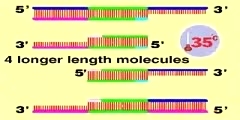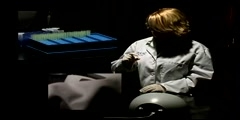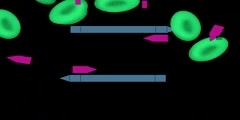The polymerase chain reaction (PCR)
WWW.OLOSCIENCE.COM]
The polymerase chain reaction (PCR) is a technique widely used in molecular biology. It derives its name from one of its key components, a DNA polymerase used to amplify a piece of DNA by in vitro enzymatic replication. As PCR progresses, the DNA thus generated is itself used as a template for replication. This sets in motion a chain reaction in which the DNA template is exponentially amplified. With PCR it is possible to amplify a single or few copies of a piece of DNA across several orders of magnitude, generating millions or more copies of the DNA piece. PCR can be extensively modified to perform a wide array of genetic manipulations./nAlmost all PCR applications employ a heat-stable DNA polymerase, such as Taq polymerase, an enzyme originally isolated from the bacterium Thermus aquaticus. This DNA polymerase enzymatically assembles a new DNA strand from DNA building blocks, the nucleotides, by using single-stranded DNA as a template and DNA oligonucleotides (also called DNA primers), which are required for initiation of DNA synthesis. The vast majority of PCR methods use thermal cycling, i.e., alternately heating and cooling the PCR sample to a defined series of temperature steps. These thermal cycling steps are necessary to physically separate the strands (at high temperatures) in a DNA double helix (DNA melting) used as template during DNA synthesis (at lower temperatures) by the DNA polymerase to selectively amplify the target DNA. The selectivity of PCR results from the use of primers that are complementary to the DNA region targeted for amplification under specific thermal cycling conditions./nDeveloped in 1984 by Kary Mullis,[1] PCR is now a common and often indispensable technique used in medical and biological research labs for a variety of applications.[2][3] These include DNA cloning for sequencing, DNA-based phylogeny, or functional analysis of genes; the diagnosis of hereditary diseases; the identification of genetic fingerprints (used in forensic sciences and paternity testing); and the detection and diagnosis of infectious diseases. In 1993 Mullis won the Nobel Prize in Chemistry for his work on PCR.
Tags //
pcr
Added: March 18, 2009, 5:48 pm
Runtime: 277.47 | Views: 67926 |
Comments:0
Type: public Video
Status: Live!
Share this video with friends! Copy and paste the link above to an email or website.
PCR and Real-time PCR
Polymerase chain reaction (PCR) enables researchers to produce millions of copies of a specific DNA sequence in approximately two hours. This automated process bypasses the need to use bacteria for amplifying DNA.
Tags //
pcr
Added: March 18, 2009, 5:50 pm
Runtime: 136.48 | Views: 44676 |
Comments:0
Type: public Video
Status: Live!
Share this video with friends! Copy and paste the link above to an email or website.
PCR polymerase chain reaction
Taq polymerase is used to replicate targeted portions of the genome during a cycle of heating and cooling. The process may be repeated thirty or forty times to get the right quantity of DNA by Gautam Rangan
Tags //
pcr
Added: March 18, 2009, 5:54 pm
Runtime: 27.07 | Views: 15807 |
Comments:0
Type: public Video
Status: Live!
Share this video with friends! Copy and paste the link above to an email or website.
PCR - polymerase chain reaction
The polymerase chain reaction (PCR) is a biochemistry and molecular biology technique[1] for exponentially amplifying a fragment of DNA, via enzymatic replication, without using a living organism (such as E. coli or yeast). PCR can be used for amplification of a single or few copies of a piece of DNA across several orders of magnitude, generating millions or more copies of the DNA piece. As PCR is an in vitro technique, it can be performed without restrictions on the form of DNA, and it can be extensively modified to perform a wide array of genetic manipulations.
Developed in 1983 by Kary Mullis, PCR is now a common technique used in medical and biological research labs for a variety of tasks, such as the sequencing of genes and the diagnosis of hereditary diseases, the identification of genetic fingerprints (used in forensics and paternity testing), the detection and diagnosis of infectious diseases, and the creation of transgenic organisms. Mullis, who won the Nobel Prize for his work on PCR, credits the psychedelic drug LSD for his invention of the technique.
text reff: wikipedia
Tags //
pcr
Added: September 10, 2007, 10:50 pm
Runtime: 613.73 | Views: 55129 |
Comments:0
Type: public Video
Status: Live!
Share this video with friends! Copy and paste the link above to an email or website.
PCR (Polymerase Chain Reaction)
The polymerase chain reaction (PCR) is a biochemistry and molecular biology technique for exponentially amplifying DNA, via enzymatic replication, without using a living organism. As PCR is an in vitro technique, it can be performed without restrictions on the form of DNA, and it can be extensively modified to perform a wide array of genetic manipulations.
Tags //
PCR DNA DNApolymerase
Added: May 16, 2007, 12:56 am
Runtime: 49.50 | Views: 22309 |
Comments:0
Type: public Video
Status: Live!
Share this video with friends! Copy and paste the link above to an email or website.




